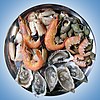
The kidneys of animals are a commonly consumed offal. The kidneys can be grilled, sautéed, roasted or braised. They can be used in cooking meat casseroles, stews or pies. Typically used in cooking are beef, veal, lamb and pork kidneys. Chicken kidneys are used in cooking, too, but fowl kidneys are very small and generally not collected to be used in food separately. Veal kidneys are preferred among cooks. The kidneys of small animals are grilled or fried, and the kidneys of larger ones are usually stewed.
The kidneys are intended to be stored in the refrigerator for no longer than one day, but they also can be frozen. Defrosted kidneys are meant to be used as soon as possible. During grilling or frying, kidneys can be overcooked, because they easily dry out. There are different recipes for cooking kidneys including recipes with such ingredients as potatoes, onions, tomatoes, shallot, mushrooms or with other meat.
Kidneys are a good source of proteins, vitamin A, riboflavin (vitamin B2 vitamer), niacin (vitamin B3 vitamer), vitamin B12, iron, phosphorus and zinc. Kidneys, along with liver, contain the most riboflavin compared to other offals and meat. Lamb and beef kidneys contain folate (vitamin B9 vitamer). Kidneys also contain small amounts of vitamin C. They are low-fat food, but they contain high amounts of cholesterol.
History
Kidneys have been used in cooking from ancient times. There is evidence of cooked kidneys in ancient Egypt. Egyptians supplied tombs of the dead with everything that dead people would need in the afterlife, including foods such as cooked kidneys. Poor people usually ate bread and boiled vegetables, while wealthy people might eat food of animal origin two or three times a day. Cooked kidneys were found in the Saqqara tomb of a female noble among other dishes.
See also
References
- Danforth, Adam (2014-03-11). Butchering Poultry, Rabbit, Lamb, Goat, and Pork: The Comprehensive Photographic Guide to Humane Slaughtering and Butchering. Storey Publishing. p. 93. ISBN 978-1-61212-182-6.
- ^ Collectif, QA international Collectif QA international (1996). The Visual Food Encyclopedia. Québec Amerique. pp. 555–556. ISBN 978-2-7644-0898-8.
- Toldra, Fidel (2022-08-26). Lawrie's Meat Science. Woodhead Publishing. p. 710. ISBN 978-0-323-98453-9.
- Company, Experts from Dole Food Experts from Dole Food; Clinic, Experts from The Mayo Experts from The Mayo; H, Experts from UCLA Center for Experts from UCLA Center for (2002-01-13). Encyclopedia of Foods: A Guide to Healthy Nutrition. Elsevier. p. 308. ISBN 978-0-08-053087-1.
{{cite book}}:|last1=has generic name (help) - ^ Cosentino, Chris; Turkell, Michael Harlan (2017-08-29). Offal Good: Cooking from the Heart, with Guts: A Cookbook. Clarkson Potter/Ten Speed. pp. 52–54. ISBN 978-0-7704-3513-4.
- Woods, Sarah (2023-02-16). Desi Kitchen. Random House. ISBN 978-0-241-53776-3.
- "Archaeology of Meat - kidney (chicken)". Chef's Mandala. 2021-05-04. Retrieved 2023-07-17.
- Westmoreland, Susan (March 2004). The Good Housekeeping Cookbook. Hearst Books. p. 179. ISBN 978-1-58816-398-1.
- Sinclair, Charles (2009-01-01). Dictionary of Food: International Food and Cooking Terms from A to Z. A&C Black. ISBN 978-1-4081-0218-3.
- Jay, Roni (2008-10-06). The Cook's Pocket Bible. Hodder & Stoughton. ISBN 978-1-907087-37-0.
- Spry, Constance; Hume, Rosemary (2014-01-19). The Constance Spry Cookery Book. Grub Street Publishers. ISBN 978-1-909166-10-3.
- K Jayathilakan; Khudsia Sultana; K Radhakrishna; A S Bawa (20 February 2011). "Utilization of byproducts and waste materials from meat, poultry and fish processing industries: a review". Journal of Food Science and Technology. 49 (3): 278–293. doi:10.1007/S13197-011-0290-7. ISSN 0022-1155. PMC 3614052. PMID 23729848. Wikidata Q36733832.
- "Beef, variety meats and by-products, kidneys, raw". fdc.nal.usda.gov. FoodData Central. Retrieved 2023-07-18.
- ^ "Lamb, variety meats and by-products, kidneys, cooked, braised". fdc.nal.usda.gov. FoodData Central. Retrieved 2023-07-18.
- Edwards, Nina (2013-06-01). Offal: A Global History. Reaktion Books. p. 8. ISBN 978-1-78023-134-1.
- ^ "When did we start cooking for each other – and why?". National Geographic. 2022-11-21. Retrieved 2023-07-17.
- Alcock, Joan Pilsbury (2006). Food in the Ancient World. Greenwood Publishing Group. p. 65. ISBN 978-0-313-33003-2.
| Meat | |||||
|---|---|---|---|---|---|
| Poultry |   | ||||
| Livestock | |||||
| Game | |||||
| Fish | |||||
| Shellfish and other seafood | |||||
| Insects | |||||
| Cuts and preparation |
| ||||
| List articles |
| ||||
| Ethics and psychology | |||||
| Alternatives | |||||
| Meat science | |||||
| Meat industry | |||||
| Related subjects | |||||